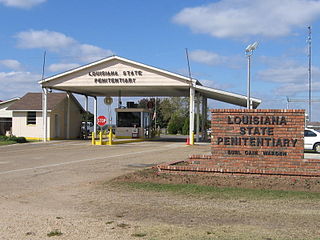Related Research Articles

In the United States, capital punishment is a legal penalty throughout the country at the federal level, in 27 states, and in American Samoa. It is also a legal penalty for some military offenses. Capital punishment has been abolished in 23 states and in the federal capital, Washington, D.C. It is usually applied for only the most serious crimes, like aggravated murder. Although it is a legal penalty in 27 states, only 20 states have the ability to execute death sentences, with the other seven, as well as the federal government, being subject to different types of moratoriums. The existence of capital punishment in the United States can be traced to early colonial Virginia. Along with Japan, South Korea, Taiwan, and Singapore, the United States is one of five advanced democracies and the only Western nation that applies the death penalty regularly. It is one of 54 countries worldwide applying it, and was the first to develop lethal injection as a method of execution, which has since been adopted by five other countries. The Philippines has since abolished executions, and Guatemala has done so for civil offenses, leaving the United States as one of four countries to still use this method. It is common practice for the condemned to be administered sedatives prior to execution, regardless of the method used.

Capital punishment is a legal punishment under the criminal justice system of the United States federal government. It can be imposed for treason, espionage, murder, large-scale drug trafficking, or attempted murder of a witness, juror, or court officer in certain cases.

Capital punishment is a legal penalty in the U.S. state of Louisiana.

In the U.S. state of California, capital punishment is a legal penalty. However it is not allowed to be carried out as of March 2019, because executions were halted by an official moratorium ordered by Governor Gavin Newsom. Prior to the moratorium, executions were frozen by a federal court order since 2006, and the litigation resulting in the court order has been on hold since the promulgation of the moratorium. Thus, there will be a court-ordered moratorium on executions after the termination of Newsom's moratorium if capital punishment remains a legal penalty in California by then.

Capital punishment is a legal penalty in the U.S. state of Ohio, although all executions have been suspended indefinitely by Governor Mike DeWine until a replacement for lethal injection is chosen by the Ohio General Assembly. The last execution in the state was in July 2018, when Robert J. Van Hook was executed via lethal injection for murder.
The U.S. state of Washington enforced capital punishment until the state's capital punishment statue was declared null and void and abolished in practice by a state Supreme Court ruling on October 11, 2018. The court ruled that it was unconstitutional as applied due to racial bias however it did not render the wider institution of capital punishment unconstitutional and rather required the statute to be amended to eliminate racial biases. From 1904 to 2010, 78 people were executed by the state; the last was Cal Coburn Brown on September 10, 2010. In April 2023, Governor Jay Inslee signed SB5087 which formally abolishing capital punishment in Washington State and removed provisions for capital punishment from state law.

Capital punishment was abolished via the legislative process on May 2, 2013, in the U.S. state of Maryland.
Gregg v. Georgia, Proffitt v. Florida, Jurek v. Texas, Woodson v. North Carolina, and Roberts v. Louisiana, 428 U.S. 153 (1976), is a landmark decision of the U.S. Supreme Court. It reaffirmed the Court's acceptance of the use of the death penalty in the United States, upholding, in particular, the death sentence imposed on Troy Leon Gregg. The case is referred to by a leading scholar as the July 2 Cases, and elsewhere referred to by the lead case Gregg. The court set forth the two main features that capital sentencing procedures must employ in order to comply with the Eighth Amendment ban on "cruel and unusual punishments". The decision essentially ended the de facto moratorium on the death penalty imposed by the Court in its 1972 decision in Furman v. Georgia 408 U.S. 238 (1972).
The National Coalition to Abolish the Death Penalty (NCADP) is a large organization dedicated to the abolition of the death penalty in the United States. Founded in 1976 by Henry Schwarzschild, the NCADP is the only fully staffed nationwide organization in the United States dedicated to the total abolition of the death penalty. It also provides extensive information regarding imminent and past executions, death penalty defendants, numbers of people executed in the U.S., as well as a detailed breakdown of the current death row population, and a list of which U.S. state and federal jurisdictions use the death penalty.

Capital punishment is a legal penalty in the U.S. state of Texas for murder, and participation in a felony resulting in death if committed by an individual who has attained or is over the age of 18.

Capital punishment is a legal penalty in Japan. In practice, the death penalty applies only to aggravated murder, but the current Penal Code and several laws lists 14 crimes for which the death penalty applies, including conspiracy to commit civil war, conspiracy with a foreign power to provoke war against Japan, murder, obstruction of the operation of railroads, ships, or airplanes resulting in the death of the victim, poisoning of the water supply resulting in the death of the victim, intentional flooding, use of a bomb, and arson of a dwelling. Executions are carried out by long drop hanging, and take place at one of the seven execution chambers located in major cities across the country.

Brittany Marlowe Holberg is a woman currently on death row in the U.S. state of Texas. On Friday, March 27, 1998, Holberg was convicted of the November 13, 1996, robbery and murder of 80-year-old A. B. Towery Sr. (1916–1996) in his southwest Amarillo home, and was sentenced to death by 251st state District Judge Patrick Pirtle. The victim had been stabbed nearly 60 times with such weapons as a paring knife, a butcher knife, a grapefruit knife and a fork. He also suffered blunt trauma to the head from a hammer, and a foot-long lamp pole had been shoved more than five inches (127 mm) down his throat.
Capital punishment was abolished in Colorado in 2020. It was legal from 1974 until 2020 prior to it being abolished. All valid death sentences as of 2020 have since been commuted to life sentences by governor Jared Polis.
The debate over capital punishment in the United States existed as early as the colonial period. As of April 2022, it remains a legal penalty within 27 states, the federal government, and military criminal justice systems. The states of Colorado, Delaware, Illinois, Maryland, New Hampshire, Virginia, and Washington abolished the death penalty within the last decade alone.
Capital punishment is currently a legal penalty in the U.S. state of Kansas, although it has not been used since 1965.
Capital punishment is a legal penalty in the U.S. state of Georgia. Georgia reintroduced the death penalty in 1973 after Furman v. Georgia ruled all states' death penalty statutes unconstitutional. The first execution to take place afterwards occurred in 1983.
Capital punishment in Delaware was abolished after being declared unconstitutional by the Delaware Supreme Court on August 2, 2016. The ruling retroactively applies to earlier death sentences, and remaining Delaware death row inmates had their sentences commuted to life imprisonment. Despite this, the capital statute for first-degree murder under Title 11, Chapter 42, Section 09, of the Delaware Code has yet to be repealed, though it is unenforceable.
Capital punishment is a legal punishment in Tennessee.
Capital punishment is a legal punishment in Pennsylvania.
Capital punishment in Malawi is a legal punishment for certain crimes. The country abolished the death penalty by a Malawian Supreme Court ruling in 2021, but it was soon reinstated. However, the country is currently under a death penalty moratorium, which has been in place since the latest execution in 1992.
References
- ↑ Roberts, Julian: "Should capital punishment be reinstated?", Saturday Night, Jul 15, 2000
- ↑ On This Day - July 14, 1976 - CBC Archives
- 1 2 Outcry as Texas prepares to execute Canadian | World news | The Guardian
- ↑ Don't Send Canadians To Be Executed !
- 1 2 Aliens' Rights Are Issue in Texas Death Row Case - New York Times
- 1 2 3 Clark, Lesley: "Activists put Death Row prisoners on the Web", Miami Herald, Nov 30, 1999
- ↑ Vishnevsky, Beth: "The Death Penalty: Opposing Views", Greenwich Village Gazette, Dec 17, 1999
- ↑ "Criminal Lawyers' Association - Legal materials - Press Releases & Submissions". Archived from the original on 2007-09-21. Retrieved 2008-02-16.
- ↑ Loyd, Linda: "Guilty Verdict in Death of Teen Shot for Jewelry", Philadelphia Inquirer, page B01, Oct 17, 1992
- ↑ "Save Jimmy Dennis". Archived from the original on 2008-02-13. Retrieved 2008-02-16.
- 1 2 Death Row Unplugged | AlterNet
- 1 2 Merle, Renae: "Death penalty opponents plead for Canadian's life", Associated Press, Dec. 8, 1998
- ↑ Faulder executed in Texas
- 1 2 3 4 USATODAY.com - Inmates use intermediaries to escape to the Internet
- 1 2 3 "polkonline.com Death row inmates given Web sites to express views 07/21/02". Archived from the original on 2008-03-12. Retrieved 2008-02-16.
- 1 2 Miller, J.L.: "A virtual reality known as death row", Delaware News Journal, pages A1-A6, Jan 30, 2000
- ↑ CCADP in the News
- ↑ Brown, Barry: "Rights advocates plead case against death row", The Buffalo News, Dec 26, 1999